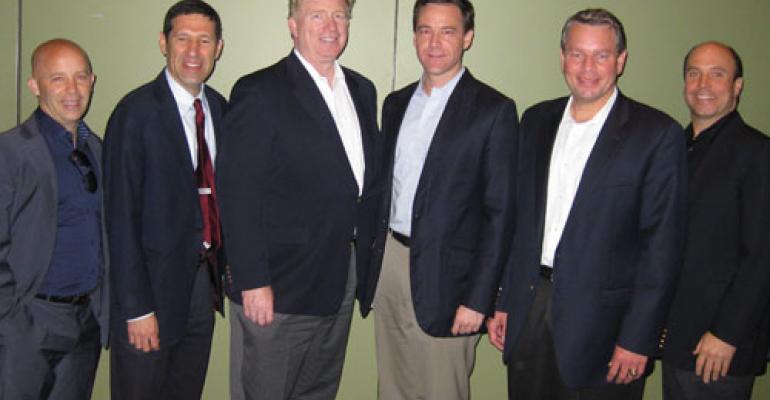As the 92nd annual National Restaurant Association Restaurant, Hotel-Motel Show opened Saturday in Chicago, industry executives gathered to discuss the availability and variety of private-equity investments.
The span of private-equity investments was on display at the NRA’s Restaurant Executive Breakfast panel, called “How Restaurants Attract Private Equity.” Moderator Ray Villaman, president of MobiMunch, summed up the situation by saying: “Obviously in the past three to four years, we’ve seen a credit crunch happening with the recession.”
The panel consisted of private-equity firms and restaurant executives, including Richard Fitzgerald, managing partner of CapitalSpring of New York; Scott Gillie, founder of GCP Restaurants LLC of Baton Rouge, La., which bought an existing 17-unit Popeyes franchise group last year; Frank Paci, president and chief executive of McAlister’s Deli; Eduardo Rallo, managing partner of Pacific Community Ventures of San Francisco; and Steve Romaniello, managing director of Roark Capital Group of Atlanta.
Roark, an example of a highly involved private-equity partner, has invested in a variety of franchised multi-unit retail concepts, including such restaurant brands as Moe’s Southwest Grill, Auntie Anne’s, Wingstop Restaurants Inc. and McAlister’s Deli.
“We’re a private equity firm that is really focused on operations and growth as opposed to financial engineering to try to drive our returns,” Romaniello said. “So that means we are in for the long haul, and it means we are going to be a bit more conservative in capital structures.”
Romaniello discussed Roark’s involvement with McAlister’s, in which it has held a stake for six years. “When we did the deal with McAlister’s… we didn’t load it up with debt,” he said. “We don’t do that with any of our investments.”
Paci, who was recruited to lead McAlister’s after Roark’s investment, said he was attracted by the private-equity firm’s level of involvement with the companies it invests in.
“If I have something I want to bounce off,” he said, “I have no problem calling Steve and talking about it.”
Fitzgerald said CapitalSpring’s three-member investment committee looks for proven franchise operators in larger brands. The firm’s deals have ranged from investing $500,000 in a single-unit pizza operation to funding a minority owner in a 70-unit Papa John’s franchise company who was looking to buy the rest of the company. The firm’s larger investments range from $15 million to $20 million.
CapitalSpring helped fund GCP Restaurants’ acquisition of 17 Popeyes units last year. Fitzgerald said the stores “needed a lot of work and Scott [Gillie] and his team had proven improvement experience,” which fits into CapitalSpring’s strategy of seeking experienced operators.
Fitzgerald said CapitalSpring invested $5 million in GCP, split between senior debt and mezzanine capital, which is typically subordinated debt.
“It’s a deal most traditional banks and a lot of conventional equity providers probably wouldn’t have looked at,” Fitzgerald said.
Gillie said he was attracted to CapitalSpring’s model even before finding the distressed units in Louisiana.
“We’re planning to grow with these guys,” Gillie said. “I did not try to track down capital with other lenders.”
Eduardo Rallo, managing partner of Pacific Community Ventures of San Francisco, invested in the Pacific Catch casual-dining chain, which opened its fourth store Saturday.
“We have known the operators for a while and looking at the company for a couple of years,” Rallo said.
PCV has provided enough capital for Pacific Catch to build seven to eight additional stores. Rallo said PCV looks for investments that would provide an exit strategy in five to seven years.
He noted that PCV is involved with managers of its investments.
“We believe it’s necessary to be hands on,” he said.
Contact Ron Ruggless at [email protected]
Follow him on Twitter: @RonRuggless




